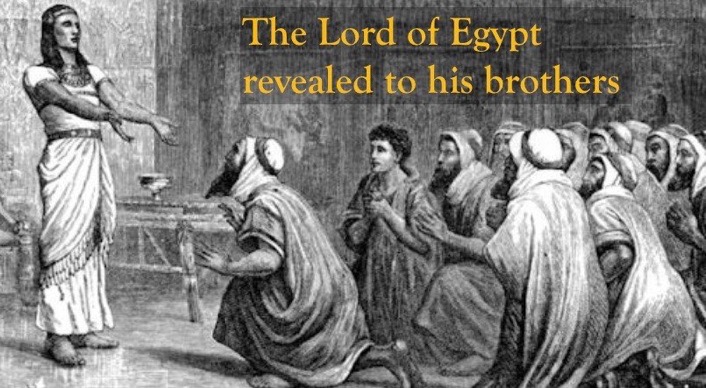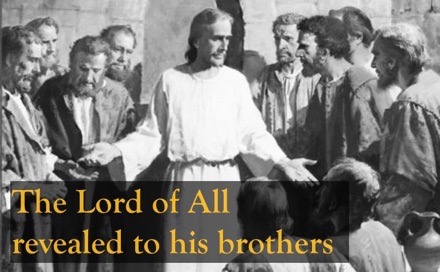
Texts: Genesis 12:1-3; 22:1 -14
Providence
Last week we heard how Abraham was called and exhibited great faith by marching his son, his only son whom he loved, up Mt. Moriah carrying the wood of the sacrifice. Abraham called that place “God will provide,” and its other name may well be Calvary.
This week there is more to be said regarding God’s providence. We wrestle with the idea of providence because there’s so much that goes wrong in life, but if we want to live faithful lives, we must believe and trust in God’s perfect providence and seek to align ourselves with God’s will. Doing so blesses us with the knowledge of his nearness and the joys of following Him.
Joseph and Benjamin were the favored two , youngest sons of Jacob. The older ten brothers—born of Leah, not Rachel—clearly exhibit the intergenerational sin passed down from Adam and clearly manifest in their father Jacob. Jacob was a liar and a cheat, though he did later repent for his brokenness—and his sons were simply mean.
Favoritism debased
With ten older brothers, Joseph face a formidable front. Put ten brothers together and you’re guaranteed to have a team, a fraternity, and a gang. They fight, they play, they argue, and they wrestle (like their father) in a constant litany of one-upsmanship.
To make it worse, little Jospeh is “indoorsy.” He doesn’t like getting his hands dirty and would rather learn the violin than play baseball. He enjoys a favored status, and his brothers are absolutely dripping with resentment over that favoritism.
The boys sleep out in their own shed, curling up as best as they can like animals in a barn, but Joseph and Benjamin sleep in the house near their father. They have soft beds, each with two pillows that are rubbed with sprigs of mint each evening by the servants. To make things worse, Joseph has dreams.
Joseph steps from the house in the morning holding a date smoothie as his brothers fight over the last scraps of yesterday’s pita bread. In his high-pitched, pubescent voice, he announces to them:
“I had a dream that all you bowed down to me like sheaves of wheat!”
Of course the brothers hated this. They hated Joseph’s favored status, and there was probably nothing more they hated in the world than Joseph’s stupid rainbow robe.
To resent the favoritism of others—to resent their privilege and place—is the very nature of envy, which is one of the seven, deadly sins. Joseph’s brothers are sickly green with it.
When Joseph is old enough for his first business trip, he’s sent 90 miles north to check on his brothers near Galilee. They see him coming from a long way off. Do they, like their uncle Esau, go running to embrace him? No. They say, “Let’s do it—let’s kill him.” The oldest brother, Reuben the responsible one, talks them into reducing his sentence to humiliation. They get that stupid, stupid coat off of him and lower him down into an empty cistern.
Rather than kill him or leave him to starve, Judah sells Joseph to southward Ishmaelites for pieces of silver.
JOSEPH IN EGYPT
Joseph excels as a servant in the house of Potiphar, Egypt’s Secretary of Defense, until Potiphar’s wife makes a false accusation, which lands Joseph in the dungeon.
He charm, good looks, and organizational savvy elevate him to prison valedictorian, and from thence come dreams of the Pharaoh.
Joseph’s interpretations land him first in Pharaoh’s court and soon he becomes the prime minister—effective leader and ruler—of the world’s sole super-power. They turn him into functional-Pharaoh: they shave his head, dab on some eye make-up, and drape him in a clean, high-quality, linen gown.
When the famine hits, Joseph feeds the multitudes, and when his ten brothers come down from Hebron to buy food, Joseph finds them bowing down to him with fear and trembling. Joseph has some fun with this by keeping his true identity concealed.
He asks them about their homeland, their other brothers and their father. Several times in the narrative, Joseph has to step aside to veil his emotions; no one should see Pharaoh’s number one crying.
The Big Reveal
After the first trip, the brothers know they cannot return without Benjamin. Jacob forbids it, at least until the food runs out, so it is some time later when they do return.
Joseph is clearly amazing: not only is he handsome, charming, and competent beyond all expectation, but he has a big, warm, breakable heart.
His brothers are seated at a royal table, and like lumberjacks at a state dinner, not only do they not know the shrimp fork from the soup spoon, but they are anxiously intimidated by the sheer power of the one at the head of the table who breaks bread with them.
Joseph knows these brothers have betrayed him, but he loves them. This is the amazing thing: he loves them. Though they are his brothers they are his enemies, and Joseph loves his enemies.
They know that with a nod of his head, Joseph could have their heads on pikes. They know their life or death in his hands. I’m sure they could barely eat, and Joseph could barely constrain himself.
Finally, he clears the room and says to them, “I am Joseph!” Blank stares. “I am Joseph whom you sold into slavery!” They see him, but they do not recognize him. They look at him with fear and wonder. Joseph draws them close. “It really is me!”
Joseph embraces them with sincere affection, and they embrace him back with fearful anticipation of justice for their evil.
Joseph says:
"But God sent me ahead of you to preserve for you a remnant on earth and to save your lives by a great deliverance. So then, it was not you who sent me here, but God."
GOD’S PRO-VISION
If we think of providence simply as God providing us with all the stuff we want or need, we miss the real meaning. The root meaning of provision is a seeing forward. God sees forward to the end of all things and knows the outcome and destiny of all. Where everything is headed God knows, so his will is said to be provident—he sees ahead.
We need to hear this meaning in contrast to providence as God giving us all the things we want and need. Certainly God does provide the needs of all who trust in Him, but it is in seeing ahead and knowing the future that makes God’s judgment and will perfectly complete.
THE BIGGER REVEAL
But just as Abraham and Isaac’s story wasn’t really about them, but God’s sacrifice of Christ on Calvary, so this story isn’t really about Joseph at all. Consider Joseph:
•Shepherd to his father’s sheep
•Favorite son of Israel
•Travelled to Egypt in his youth
•Despised for his greatness
•Jealous brothers who wanted to kill him
•Betrayed by Judah for pieces of silver
•Had two prisoners with him: one saved, the other condemned.
•Stripped of royal robe and put down into an empty cistern.
•Pulled from the pit and elevated to the right hand of the Pharaoh.
•Draped in a fine, linen robe.
•Fed the multitudes
•Joseph, revealed, was not recognized.
•Joseph, revealed, forgave his brothers.
•Joseph loved his “enemies.”
•Joseph shared the wealth of his inheritance.
WHOSE STORY IS IT?
Consider Jesus:
•Shepherd to his father’s sheep
•Favorite son of Israel
•Travelled to Egypt in his youth
•Despised for his greatness
•Jealous brothers (Pharisees, Sadducees, and others) who wanted to kill him
•Betrayed by Judas(Judah) for pieces of silver
•Had two prisoners with him: one saved, the other condemned.
•Stripped of royal robe and put down into an empty cistern [literally, the holding cell beneath the house of Caiaphas is an empty cistern].
•Pulled from the pit and elevated to the right hand of the God.
•Draped in a fine, linen robe (left behind in the tomb for a fine robe of glory).
•Fed the multitudes
•Jesus, revealed, was not recognized.
•Jesus, revealed, forgives his brothers.
•Jesus loves his “enemies.”
•Jesus shares the wealth of his inheritance.
How it is even possible to hear this story without seeing Jesus is unthinkable. 1900 years before Jesus was born, a prophecy was proclaimed. The prophecy was not proclaimed by a human prophet, or even a human voice, but a prophecy that is written in the events of ancient history.
Anyone can make up a prophecy about the future. It is even possible to engineer events so that they fulfill the details of a former prophecy, but what are we to say when one history proclaims and foretells another history whose details could not have been engineered because its chief principals were enemies of the prophecy to begin with?
Could the story of Jesus have been engineered to echo the story of Joseph? Really? When the main agents were Roman and Jews who were eager to discredit Jesus? How is it they could have conspired (they were not friends) to reveal Jesus through their attempts to destroy him?
The good news is that God is the Word. God speaks and history occurs. God sees ahead by millennia what shall be and sets the events in place all patently designed to reveal Jesus and win our faith and obedience.
The good news is: he knows us—and loves us—even before we recognize him!
God, veiled in flesh, is revealed decisively, sufficiently, and all-powerfully through the man named Jesus, who was crucified as a sign of God’s faithfulness to his promises, and as atonement for the sins of humankind. ..†
